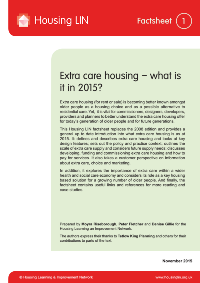LINks - the Housing LIN's essential weekly bulletin (w/c 9 Nov)
Welcome to LINks, the weekly e-bulletin from the Housing LIN (Learning and Improvement Network) where we put a selection of latest information, resources and events under the spotlight. In this week's issue, we would like to draw your attention to the following:
New Housing LIN factsheet. Extra Care Housing: What is it in 2015?
 This Housing LIN factsheet replaces the 2008 edition and provides a general up to date introduction into extra care housing is as at 2015. It defines and describes extra care housing and looks at key design features; sets out the policy and practice context; outlines the scale of extra care supply and considers future supply needs; discusses developing, funding and commissioning extra care housing and how to pay for services. It also takes a customer perspective on information about extra care, choice and marketing. In addition, it explores the importance of extra care within a wider health and social care economy and considers its role as a key housing based solution for a growing number of older people. And finally, the factsheet contains useful links and references for more reading and case studies.
This Housing LIN factsheet replaces the 2008 edition and provides a general up to date introduction into extra care housing is as at 2015. It defines and describes extra care housing and looks at key design features; sets out the policy and practice context; outlines the scale of extra care supply and considers future supply needs; discusses developing, funding and commissioning extra care housing and how to pay for services. It also takes a customer perspective on information about extra care, choice and marketing. In addition, it explores the importance of extra care within a wider health and social care economy and considers its role as a key housing based solution for a growing number of older people. And finally, the factsheet contains useful links and references for more reading and case studies.
And to view our dedicated pages on everything you need to know about extra care housing, go to: http://www.housinglin.org.uk/Topics/browse/HousingExtraCare/ (opens new window)
New Housing LIN case study. Care Closer to Home. The Gateway, Middlesbrough: A New Integrated Health, Social Care & Housing Pathway
![]()
Launched to coincide with our NE Housing LIN conference this week in Durham, this case study sets out the economic, health and social benefits of Keiro's service model at The Gateway Centre, Middlesbrough. The Centre is a 40 bed facility with a Community Hub and 12 transitional living options providing residential nursing and both residential and non-residential rehabilitation and support services and housing for clients with long term neurological conditions and other complex needs. It demonstrates how the service can support patients, Local Authorities and the NHS to help people to access an array of specialist transitional rehabilitation and support services and, in partnership with Thirteen Housing Group, provide move-on and long term accommodation to reduce the demand upon NHS services, reducing the time that patients have to wait for an intervention and the default use of care homes as a long-term solution.

For further information collated by the Housing LIN on housing, health and care pathways, visit:
Retirement Living - Where is the Opportunity?
![]()
Jones Lang LaSalle (JLL) have published this report that explores the market and examines the huge potential that exists for operators, developers and investors. It highlights a chronic shortage of high quality retirement housing is reaching crisis point in the UK. By 2025 JLL estimates 725,000 housing-with-care units (24 hour assisted care) are desperately needed to meet demand from the ageing Baby Boomer generation. Many of these retirees want to live in specialised housing, and they have the cash to afford it with over 65s currently holding £800 billion in housing equity.
NICE guidelines: Older people with social care needs and multiple long-term conditions

These latest guidelines from NICE emphasize the importance of empowering older people and their carers to choose and manage their own support. It makes recommendations about identifying and assessing social care needs, care planning, supporting carers, integrating health and social care planning, delivering care, preventing social isolation and training practitioners.
Thinking Ahead: Housing, Care & Related Finance in Later Life
Silverlinks has developed a new 'teach yourself' booklet which covers different aspects of making decisions about housing & care, to help people reach informed decisions that are right for them. Importantly, it also gives details of where to go for further information, advice and practical support.
More at: https://dl.dropboxusercontent.com/u/32820470/workbook.html (opens new window)
Understanding the self-funding market in social care: a toolkit for commissioners

This second edition of IPC's self-funder toolkit has been produced to help local authorities ensure that they comply with the requirements of the 2014 Care Act, helping them understand their self-funder population so that they can facilitate and shape their local care market to meet the needs of the whole population. This new version has been rewritten following the implementation of the Care Act and includes new information on estimating numbers as well as updated case studies.
The Care Collapse: The imminent crisis in residential care and its impact on the NHS

ResPublica has undertaken research assessing the state of the residential care industry, including an analysis of its future financial viability. This will inform a full report, to be published in the new year, setting out our broader vision of the future of care providers: acting as the 'agents of integration' in a more joined-up health and social care system. In short, it found a funding gap of over £1 billion for older people's residential care alone by 2020/21, which could result in the loss of around 37,000 beds. In addition, they predict if all these care home lost beds were to flow through to hospitals in this way, the annual cost to the NHS would total £3 billion.
Disabled people's experiences of social care

A new report by Scope shows that over half of disabled people using social care (55%) can't get the support they need to live independently and one in three (33%) who get social care expect it to get worse in the next five years. The findings from the Better Care Project 2014-2015 shows that another one in ten disabled people, (10%) who rely on social care for all areas of life, fear they will lose support entirely.
Find out more at: http://www.housinglin.org.uk/Topics/browse/CareAndSupportatHome/Prevention/?parent=9759&child=9884 (opens new window)
Age and Social Isolation

This report by the Equal Opportunities Committee at the Scottish Parliament is the result of an inquiry focusing on the potential impacts of social isolation on both older and younger people in Scotland. In relation to housing it recommended that, to combat social isolation, future housing developments should take into account planning and location, design and construction, and models of occupancy. And with regard to technology, the committee called for research to examine the potential positive and negative impacts of technology on people who are socially isolated and lonely.
View at: http://www.housinglin.org.uk/HousingRegions/Scotland/?parent=9426&child=9864 (opens new window)
Housing in London: Addressing the supply crises

This report from the LSE makes interesting reading, especially identifying some of the planning barriers/land availability and the changes that need to take place to address a housing shortage. However, there is no mention of housing for older Londoners when 1:6 people are aged over 65!
To find our more on housing for older Londoners, register to attend our London regional meeting next week and/or joint seminar with the Design Council CABE in early December. See details below.
Dementia Core Skills Education and Training Framework
This Framework was commissioned and funded by the Department of Health and developed in collaboration by Skills for Health and Health Education in partnership with Skills for Care. Although not specifically tailored for the housing sector, its contents are very relevant to housing staff. It details the essential skills and knowledge necessary across the health and social care spectrum. It describes three tiers: awareness which everybody should have; basic skills which are relevant to all staff in settings where people with dementia are likely to appear; and finally, leadership. This authoritative framework is complemented by the 'Making a Start' report and Resource pack which tailors information specifically for the housing sector and lists sources of dementia training.
Find the Making a Start report and resource pack on our dementia, training and workforce pages at: http://www.housinglin.org.uk/Topics/browse/HousingandDementia/Practice/Workforce/ (opens new window)
To view the skills framework, go to: http://www.housinglin.org.uk/Topics/browse/HousingandDementia/Practice/Workforce/?parent=5154&child=9883 (opens new window)
Telecare News Headlines

This week's news headlines from the Telecare LIN can be downloaded in two formats (doc; pdf) at:
- Telecare News Headlines: 12 November 2015 (doc 117Kb) (opens new window)
- Telecare News Headlines: 12 November 2015 (pdf 373Kb) (opens new window)
Accessible Housing Standards 2015 briefing
Habinteg have published a briefing to help with the transition to the new national housing standards. As reported in LINks last month, technical standards have been introduced in England from 1 October 2015. This briefing, aimed at local authority planners, developers, architects and access professionals, compares the technical specification provided in the new 2015 Building Regulations M(4) Category 2, 'accessible, adaptable dwellings' with the 16 design criteria set out in its predecessor, the Lifetime Homes Standard (2011).
To find out more about the national housing standards and accessible housing, visit the Housing LIN online 'design hub' at: http://www.housinglin.org.uk/Topics/browse/Design_building/AccessibleDesign/ (opens new window)
Forthcoming Housing LIN events/meetings
Please note that we are currently planning a series of free regional events and meetings, as follows:
- London Housing LIN regional meeting on Monday, 16 November in Morden
- London Housing LIN/Design Council CABE event on Friday, 4 December in Angel
More information and registrations to attend these events can be found at: http://www.housinglin.org.uk/Events/ForthcomingEvents/ (opens new window)
If you are not already registered to receive notifications about our events and meetings in your region, create your own Housing LIN account by logging at: www.housinglin.org.uk/useraccount/ (opens new window)
Please note that due to the release of the Housing LIN quarterly newsletter next week LINks will be put on hold until the following week.
Stay networked with the Housing LIN for latest news, views and resources on housing with care matters.
